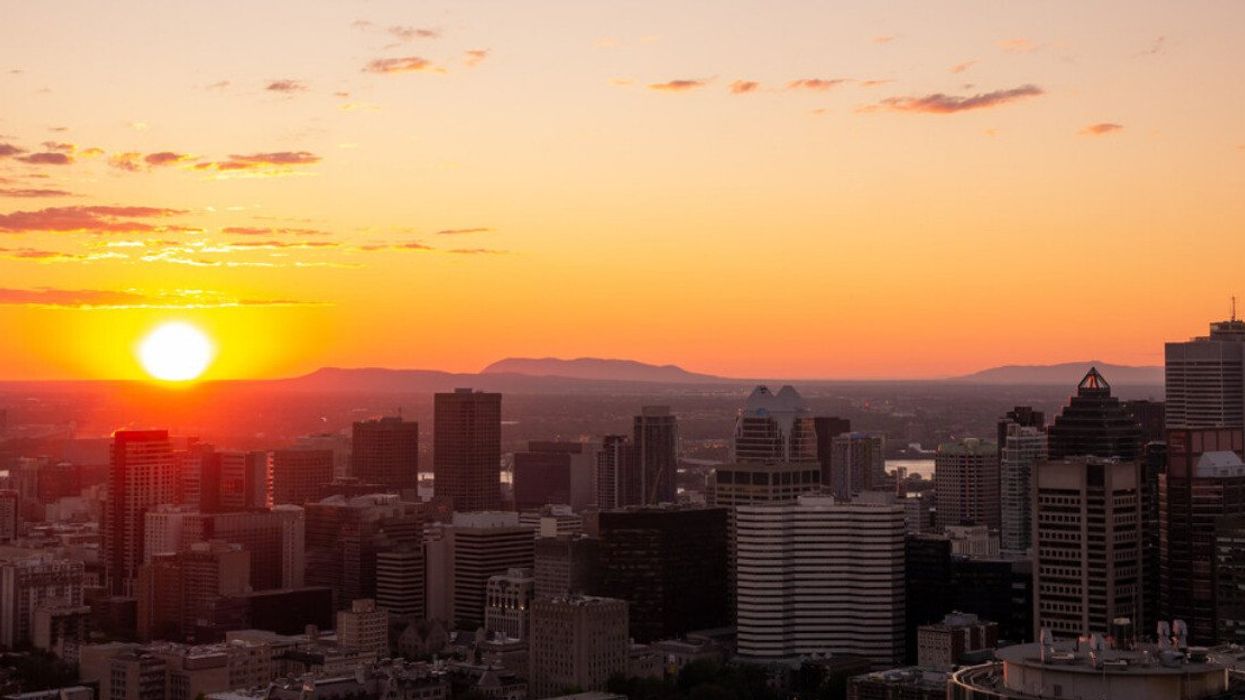Daylight Saving Time Is Coming Up & Quebec Is Still Not Ready To Stop Changing The Clock
You might be feeling a bit tired. ⏰

Sunrise over the Montreal skyline.
It's that time of year again when Canadians face the annual ritual of losing an hour of precious sleep to daylight saving time. In a few weeks, the nation will collectively groan as clocks are set forward, marking the beginning of longer evenings and, for many, a week filled with extra yawns and caffeine cravings.
Springing forward
Daylight saving time, that period between March and November when clocks are set an hour ahead to extend evening daylight, is a practice that affects the daily routines of millions.
It's observed across nine provinces and two territories, though there are some exceptions in parts of these areas and in Nunavut. Most of Saskatchewan aligns with Central Standard Time all year, despite its geographic placement in the Mountain Time Zone. Yukon stopped adjusting its clocks seasonally in 2020, opting instead for a constant Mountain Standard Time year-round.
This year, the process starts on Sunday, March 10, at 2 a.m. local time. The moment marks the beginning of longer evenings, a shift favoured by those who appreciate more daylight after work, but it comes at the cost of losing an hour of sleep.
The reversal of the time theft occurs in November. When clocks retreat an hour, we experience the temporary joy of an extra hour of sleep, a small consolation for impending winter darkness.
The debate over saving daylight
Introduced to save energy during war times, daylight saving time now primarily extends our evening activities under the guise of sunlight. The biannual time tinkering has not been without its critics, many of whom question its current relevance and the sleep disruption it causes.
Despite growing disdain for the clock-changing tradition, efforts to abolish it have been caught in legislative limbo, leaving many to wonder if we will ever escape the cycle. While some provinces, like Quebec and Ontario, are considering making daylight saving time permanent, the decision is reliant on regional consensus and legislative approval, maintaining the perpetual state of temporal adjustment.
In 2020, the province passed a law to stop changing the clocks and keep daylight saving time all year. But, this can only happen if Quebec and New York decide to do the same. Since getting the official go-ahead in 2020, there hasn't been any movement. Similarly, Ontario's Bill 214, which would make daylight saving time permanent, is stalled, waiting for Quebec and New York to adopt the same change
This year's daylight saving time not only promises later sunsets but also a reminder of the peculiar ways in which we attempt to harness time to our advantage. It underscores our enduring quest for more daylight, even if it means borrowing an hour from our future selves only to begrudgingly give it back months later. In our quest for more daylight, we're all just a bit sleepier for it.
- Quebec Is 'Open' To Daylight Saving Time Lasting All Year, But There's A Catch ›
- Daylight Saving Time: Prepare To Lose An Hour Of Sleep, But Gain More Time In The Sun ›
- Daylight Savings Is Coming Up & The Time Jump Can Have Sneaky Effects On Your Body ›
- Daylight Saving Time Returns This Weekend — Here's What Time Clocks Spring Forward - MTL Blog ›
